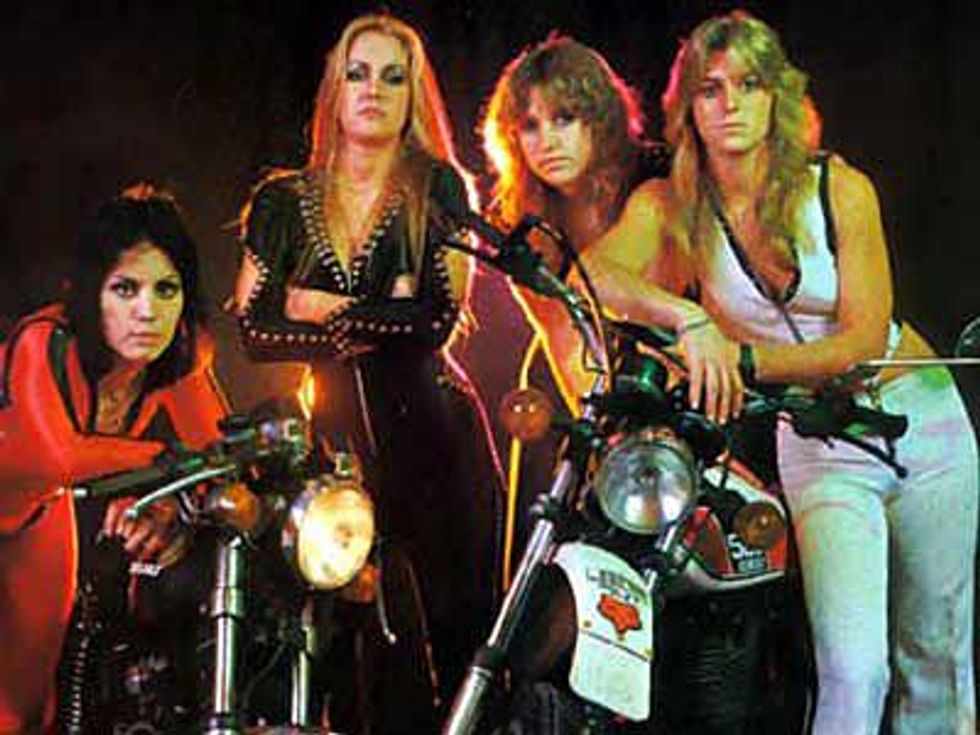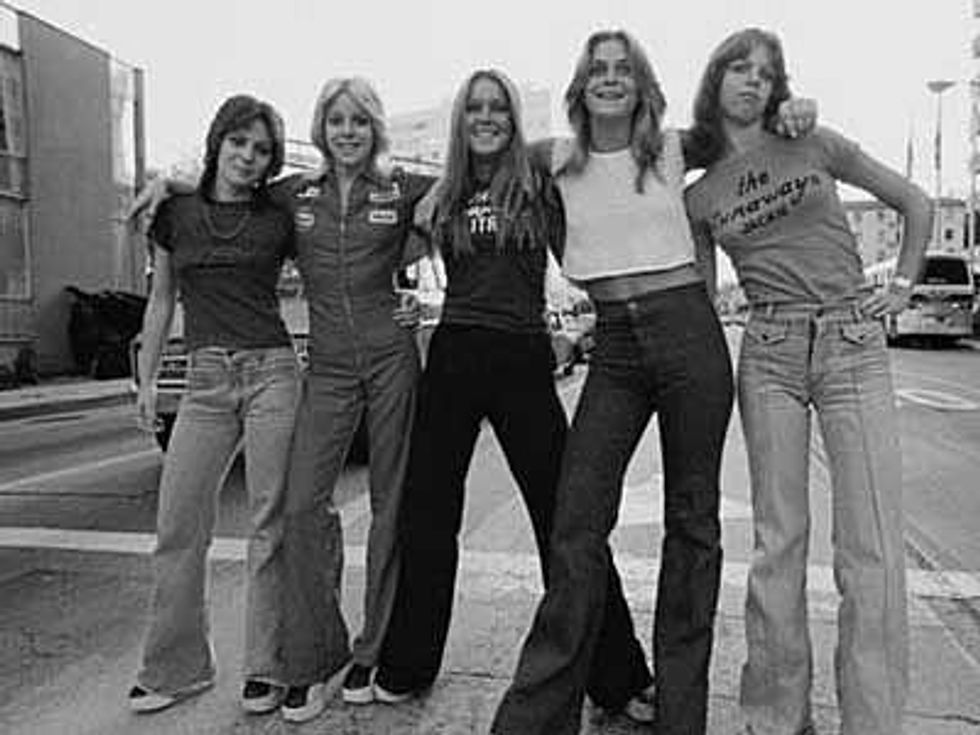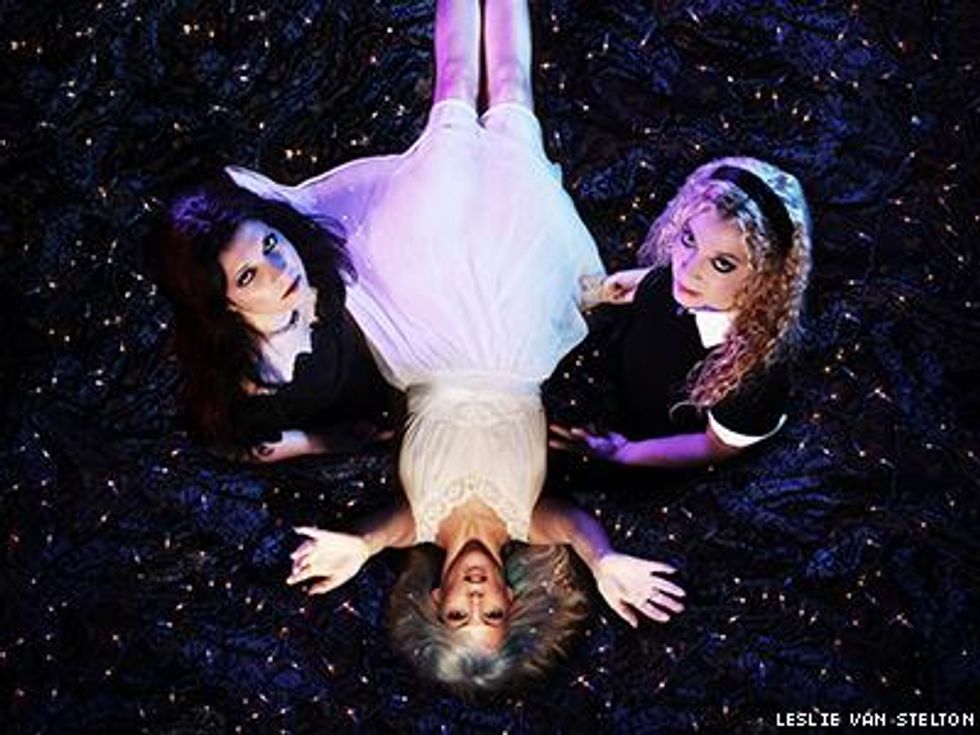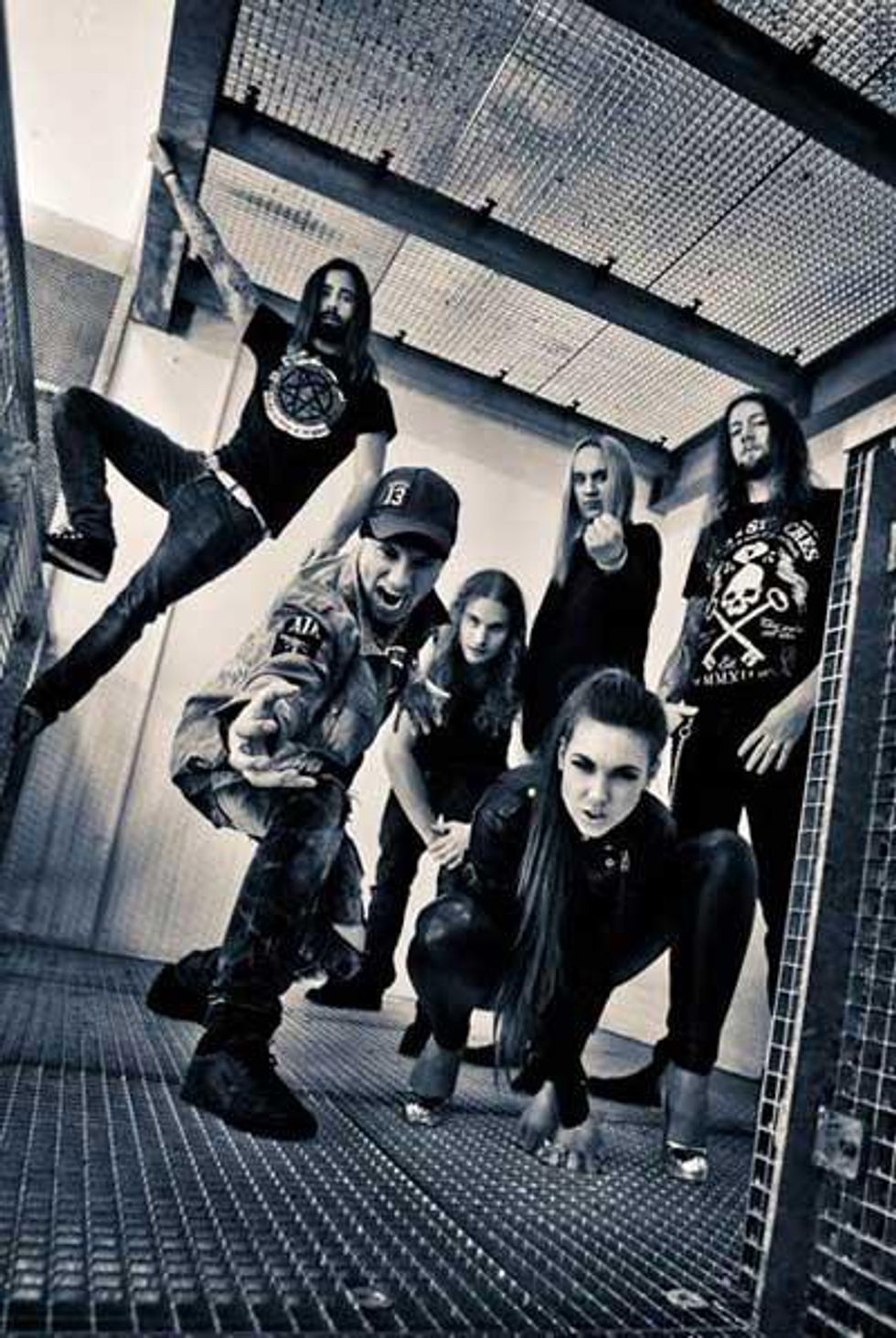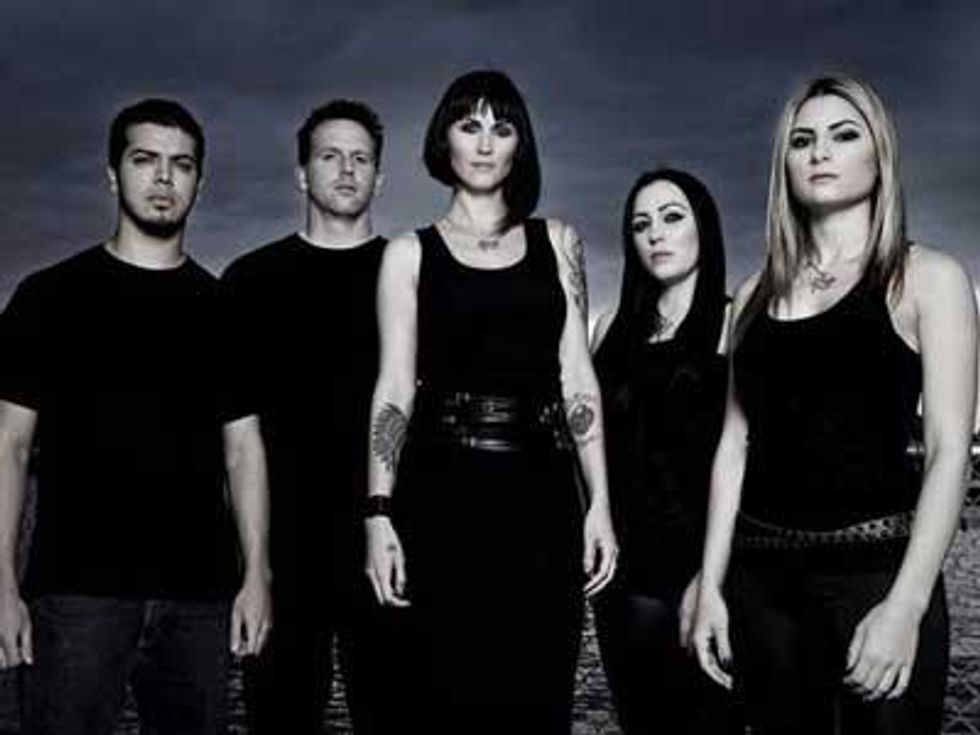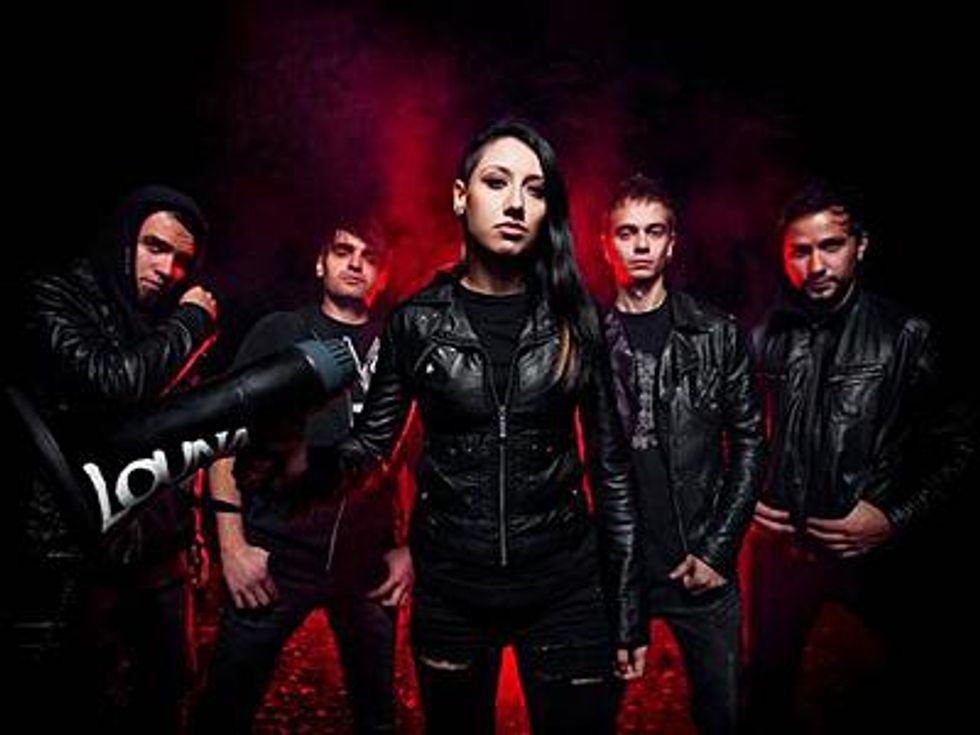When I was 10 years old, I watched a TV clip of a hot new band that was being billed as the first all-girl rock band, the Runaways (though fans of Fanny like David Bowie, who said they "played like mother fuckers," would disagree). By now -- thanks in large part to a movie of the same name starring Dakota Fanning and Kristen Stewart -- most people know the Runaways' history, or at least the mythology, of the band that rocked hard, played hard, and imploded before I was old enough to go to a concert by myself. But I remember being mesmerized by the hard rock sounds (so unlike the disco my mom had been playing for years), the attractive blonds (Joan Jett was the only one with black hair), the lyrics (Hello Daddy, hello Mom/ I'm your ch-ch-ch-ch-ch cherry bomb!), and the raw, rough-edged, loud-mouthed girls saying things that made men uncomfortable. But mostly I loved watching Joan Jett and Lita Ford shredding guitars in unison, Jett nearly exploding out of her own skin, Ford's waist-length hair moving away from her body as if gravity didn't exist each time she lifted the guitar above her pelvic region, like Mufasa anointing Simba in The Lion King.
My love of rock waned as I discovered the synthetic sounds and androgynous music videos of the new wave movement as a teen. But my attraction to Lita Ford never did, which is ironic because, according to Evelyn McDonnell's brilliant, must-read new tome, Queens of Noise: The Real Story of the Runaways (Da Capo Press), of the original band members, Ford was the only one who wasn't lesbian or bisexual. In fact, when she first quit the band after only three days there were three main factors: the band's songs weren't hard-edged enough (Ford is from heavy metal stronghold of Long Beach, Calif.), the manager/svengali/promoter Kim Fowley was a handful to deal with, and few could take his foul behavior, and the other girls were queer.
Above and below: The Runaways
Ford told McDonnell, "I had never been around people like the Runaways. They were gay and I wasn't. It was wild to me. My parents had never explained to me that people are gay. When I met them, I was like, 'You like girls, but you're a girl.' I didn't figure it out, I didn't like it, and I didn't want to be around it.'"
Of course, like everyone in America, Ford evolved over the years; in her case, within weeks she was back with the band at a time when many of bandmates, including oft-overlooked songwriter Kari Krome (who says Joan Jett was her first girlfriend), were sharing beds and exploring their sexuality just like the rest of 1970s America.
A towering blond who even now still sports black shirts, tight jeans, tattoos, and hard abs, Ford later went solo and became a heavy metal musician, combing her own wailing lyrics with badass showmanship and loud, macho guitar solos. She was, for much of the 1980s, either the only or one of the only women doing solo work in the mainstream heavy metal arena. My Ford zenith, though, came in 1988 when Ford had her highest charting song, a metal ballad duet with Ozzy Osbourne called "Close My Eyes Forever", which hit number eight on the Billboard Hot 100.
You see by then I was an Ozzy Osbourne fanatic, and a die-hard metal head, which most people find funny when they realize I'm queer. When I came out as a lesbian, in fact, I tried hard to lose the metal love, hitting women's music festivals, buying Olivia records, and listening to every folk rock feminist band there is from Indigo Girls to Sweet Honey In The Rock. But pushed to choose, even with the hundreds of great lesbian-led folkies I listen to, I'd choose Ozzy any day.
Most people today know Ozzy from his reality show The Osbournes, his longtime wife Sharon (from The Talk), and their daughter Kelly (E!'s Fashion Police). Decades before all that, however, he was (and is) an amazing performer who turns his daytime inaudible mumble into breathtaking and heartbreaking, sociopolitical song lyrics.
Ozzy, who rose to fame as the lead singer of heavy metal pioneers Black Sabbath, (most folks call Ozzy the "Godfather of Heavy Metal") with their 1970 self-titled debut and the many albums that followed, including their thirteenth album, which came out this summer, titled 13. To celebrate, all three members of Sabbath participated in a Google+ Town Hall. Surprise you? It shouldn't, after all Ozzy, Black Sabbath, and heavy metal have all become part of our mainstream culture.
The thing is, in 1985, metal was seen as a boys club (it was), Devil's music (it wasn't), sexist (like porn, sexism is sometimes in the eye of the beholder), and a danger to adolescents (it was blamed for every suicide or school shooting in the 1980s). But to me it was real, and raw, and sexual, and empowering. The songs about sex that some thought were sexist -- from Def Leppard's "Pour Some Sugar on Me" to Warrant's "Cherry Pie" -- weren't sexist to me, though their videos often were. For me the songs were about women's right to own our sexuality, and the self-empowerment to fuck like men. I wanted and enjoyed sex and these heavy metal songs made it OK for me to do so without the syrupy love-and-forever commitments women were supposed to experience and were generally everywhere in pop songs of the day.
Ozzy let me work through other issues from breakups ("So Tired") to bullying ("You're No Different"). His song, "Suicide Solution," with lyrics like "Wine is fine / but whiskey's quicker / suicide is slow with liquor" was a favorite with kids who had an alcoholic parent as I did. Because rather than encouraging suicide, as religious critics argued, it was about how alcoholism kills slowly, and while you're living in that bottle there's a metaphoric death of spirit, emotion, connection all around you. It wasn't his only smart song; 99% of his songs are smart and sociopolitical and feminist. "No Bone Movies," for example, decries pornography's grasp on men and the degradation of women; "Revelation (Mother)" is about war and the environment; "Crazy Train" is about conformity, media manipulation, and homogeny (which can be read as heteronormativity).
And I know plenty of lesbians who found teenage escape in those songs. My last year of high school and first year of college I fell asleep every night to Ozzy's first album, Blizzard of Oz, playing on my Walkman cassette player.
Today, Ozzy and his wife Sharon are huge LGBT allies. This year Ozzy even performed at the L.A. Gay and Lesbian Center for a lesbian event called Evening of Women. He was one of the few men there. I could have plotzed, I was so excited.
My Ozzy love endures three decades later, and I can't wait to see he and Black Sabbath on tour next month, as does my love of other male-led heavy metal bands. Judas Priest deserves nods, not just because band member Rob Halford -- called "the beast from Judas Priest" by fans -- is gay, but because they introduced S/M to the masses and their music continues to be smart and subversively feminist (in fact, in Screaming for Vengeance, their 30th Anniversary Bonus Live DVD, they cover a Joan Baez song just as they did on their debut album). Their newest release, Epitaph, is a 23-song, live concert DVD that celebrates their 40 years of heavy metal dominance.
But I digress. While I'll always love these bands and Ozzy the most, it's women who are taking over heavy metal now.
The best metal tribute bands out there are all-women. Just watch ThundHerStruck perform "Shook Me All Night Long" or AC/DShe rip "Highway to Hell" and you'll understand the empowerment factor of heavy metal. In fact, I listen to some of these bands daily and have seen almost every one of them in concert. Hell's Belles, Iron Maidens, Zepparella, and Lady Zep all deserve listens, for their ferocious guitars and absolute command of the stage, and because these female tribute bands have a lot of lesbians in them. One band confronts that with their name, Lez Zepplin, a hard rocking, sexy group that has, in proportion, inspired as many lesbian groupies as the original band's army of straight girl fans. I mean, they have to kick them off of their tour bus, and throngs hang out at concerts wearing "Get the Lez Out" tees, head bopping, fists up, and holding their cell phones up in the air like the lighters the original Zepplin fans once sported.
Above: Star & Dagger
Even better, original metal bands that are either all-female or are female-fronted are also taking center stage and creating music that is often game-changing. My new favorites, Star & Dagger, is an all-woman metal band from New Orleans that has just released its debut album, Tomorrowland Blues. The group features Sean Yseult (White Zombie), Dava She Wolf (Cycle Sluts From Hell) and newcomer Von Hesseling, whose towering vocals and stage presence draw comparisons the Runaways lead singer, Cherie Currie. The music is full of poignant lyrics and low-end riffs, and sublime swagger.
Above: Amaranthe
There's also Butcher Babies and Huntress (who both jammed out at the Rockstar Energy Drink Mayhem last June and sounded more amazing than the bigger bands like Rob Zombie), and female-fronted, Swedish/Danish modern metal powerhouse Amaranthe, whose songs from their new full-length album The Nexus, landed on the iTunes Metal chart at No. 1 on the first day of release.
Eye Ra Haze, a band that straddles the lines around music (is it progressive rock? Is it metal?). Their cover of "Stay" by Rihanna is fascinating and the song, "Warships," from their new album Eye of the Storm, is a perfect example of their new kind of hybrid metal music that's both enticing and heavy, largely thanks to the female triple-threat of vocalist Natasha Nicholson, guitarist Nicole Papastavrou, and classical pianist Karine Catenacci (there are two boys in the band as well).
Above: Eye Ra Haze
The female-fronted Russian band Louna, whose newest album is Behind a Mask, is a modern protest band that's part of the movement in that country (Pussy Riot is the most well-known of the movement, but Louna is highly visible as well). They've made waves this year by supporting LGBT Russians and condemning Vladimir Putin's new antigay laws, and for raising money for Pussy Riot's defense and support. Plus, lead singer Lousine Gevorkian is not hard on the eyes.
Above: Louna
The South Carolina female-fronted technical death metal band Your Chance to Die, just released their sophomore full-length album, The American Dream. Think growly, ambient tracks and shred-worthy guitar solos, but there's melody too, which is sometimes missing in other death metal. A lot of guys think a female-fronted technical death metal band isn't legitimate death metal, but one watch of their new music video for the single 'Oscuridad' and its clear that this band gives all-male death metal bands a real run for their money. (And yes, that sound is coming from a woman. Discuss.)
I could go on, but this isn't supposed to be about all the great new female heavy metal bands out there. It's about how heavy metal music made me the woman I am, and without Ozzy Osbourne, I probably wouldn't be the queer I am. So, I guess I owe Ozzy as much as I do Harvey Milk or Gloria Steinem. Next time I see him at a lesbian event, I'll let him know that.
DIANE ANDERSON-MINSHALL is The Advocate's editor at large and the editor in chief of HIV Plus magazine.


